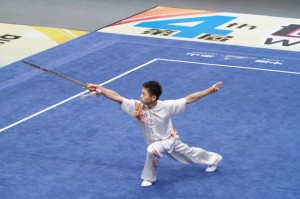Literally defined, Wushu is the modern competitive form of traditional Chinese Kung Fu. Best described as a cross between gymnastics, dance, and martial arts, it is a demo-styled exposition of weapons and traditional Kung Fu elements. Emotionally defined, wushu is my way of life. As an athlete, my body is the instrument through which internal rhythm is conveyed. Each movement, each step, is like a note in a symphony, a perfect harmony of 
At this point, you are probably wondering what in the world wushu has to do with Model UN. On first glance, MUN and martial arts seem to have no relation whatsoever. However, these two activities collide at the intersection of my interests and share one fundamental characteristic: passion.
Passion is perhaps the most powerful driving force of progress today. Its potential knows no bounds and its opportunities remain limitless. Especially in the field of MUN, passion is essential. After all, conferences require hours of research and prolonged debate on difficult and abstract topics when we could otherwise be sleeping or catching up on schoolwork. Moreover, MUN forces you into some of the most uncomfortable social situations including a multitude of opportunities for public humiliation and embarrassment. For these reasons and more, many of my friends are constantly curious as to why I choose to spend my time in this academic activity. The clear answer? Passion.
In my mind, MUN participants are a special breed of people. We are defined by this shared passion for diplomacy, international relations, and most importantly, social  . We revel in navigating the social pathways within conferences and it is here that we thrive and feel truly alive. Subsisting on a minimal amount of sleep, we obtain our energy at conference from stimulating proposals and solutions to universal problems. Some people derive their passion from a sense of purpose. That these topics discussed have a much larger scope and our time is well spent in addressing them. Others do it for the thrill. Whatever the reason, the best delegates all derive their passion from somewhere, and from there it spreads like wildfire engulfing a committee room.
. We revel in navigating the social pathways within conferences and it is here that we thrive and feel truly alive. Subsisting on a minimal amount of sleep, we obtain our energy at conference from stimulating proposals and solutions to universal problems. Some people derive their passion from a sense of purpose. That these topics discussed have a much larger scope and our time is well spent in addressing them. Others do it for the thrill. Whatever the reason, the best delegates all derive their passion from somewhere, and from there it spreads like wildfire engulfing a committee room.
The saddest part of MUN for me is seeing delegates who give up. Those people who sit in the back of conferences and refuse to participate. In my experience, these delegates actually have great passion for MUN. After all, voluntarily attending conferences means that you have to have some interests in international relations. Many students refuse to participate because their passion was not nurtured properly. We all remember our first conference and the incredible bone-shaking nerves that consumed us. The most important part of our MUN career lies in the decision to surmount this initial social wall and dive into the madness of conferences. Some people fit right in from their first MUN experience and become natural MUN superstars. For others it may take a couple conferences, or as in my case, four. Either way, I encourage you to leap before you look. Whether it is in the field of science, music, Model UN, or even martial arts, passion should never be suppressed. You never know where the next Bruce Lee or Ban-Ki Moon could be hiding.

